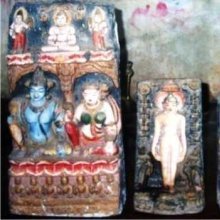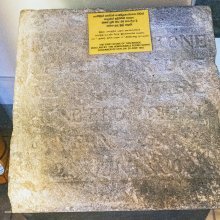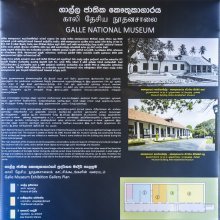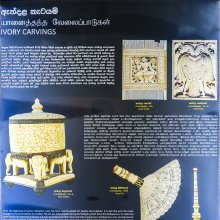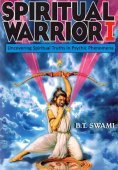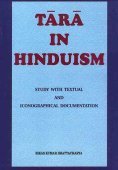Matha, Maṭha, Mātha: 23 definitions
Introduction:
Matha means something in Hinduism, Sanskrit, the history of ancient India, Marathi, Hindi, biology. If you want to know the exact meaning, history, etymology or English translation of this term then check out the descriptions on this page. Add your comment or reference to a book if you want to contribute to this summary article.
Images (photo gallery)
In Hinduism
Vaishnavism (Vaishava dharma)
Source: ISKCON Press: GlossaryMaṭha (मठ).—A temple of the Lord with an attached residence or āśrama for brahmacārīs (celibate students) and sannyāsīs (renunciants) to live; monastery.
Source: Pure Bhakti: Bhagavad-gita (4th edition)Maṭha (मठ) refers to “a temple of the Lord with attached living quarters for brahmacārīs and sannyāsīs; a monastery”. (cf. Glossary page from Śrīmad-Bhagavad-Gītā).
Source: Pure Bhakti: Brhad BhagavatamrtamMaṭha (मठ) refers to:—Āśrama; monastery. (cf. Glossary page from Śrī Bṛhad-bhāgavatāmṛta).

Vaishnava (वैष्णव, vaiṣṇava) or vaishnavism (vaiṣṇavism) represents a tradition of Hinduism worshipping Vishnu as the supreme Lord. Similar to the Shaktism and Shaivism traditions, Vaishnavism also developed as an individual movement, famous for its exposition of the dashavatara (‘ten avatars of Vishnu’).
Purana and Itihasa (epic history)
Source: Cologne Digital Sanskrit Dictionaries: The Purana IndexMaṭha (मठ).—Public halls in the city of Tripura;1 institutions of.2

The Purana (पुराण, purāṇas) refers to Sanskrit literature preserving ancient India’s vast cultural history, including historical legends, religious ceremonies, various arts and sciences. The eighteen mahapuranas total over 400,000 shlokas (metrical couplets) and date to at least several centuries BCE.
Shaktism (Shakta philosophy)
Source: Google Books: ManthanabhairavatantramMaṭha (मठ) refers to “monasteries”, according to the Manthānabhairavatantra, a vast sprawling work that belongs to a corpus of Tantric texts concerned with the worship of the goddess Kubjikā.—This ‘Lord of Yogis’ [Cf. Kumārikākhaṇḍa verse 5.41cd-43] lives in temples. This is in accord with the lifestyle of the ascetics of an earlier period who, prior to the development of monasteries (maṭha), lived in temples when they were not wandering about. This archaic trait is combined with another that appears in the early Tantras—he wanders in 'sacred seat and field'. The development of the outer sacred geography that this implies is an essential and integral part of the Kaula modality of practice as is its internalisation. Right
Note: Various Maṭhas (“monasteries”) are associated with the sacred seats (pīṭha).—The Tantras were studied, and probably a good many were redacted, in monasteries. It makes sense, therefore, that they are amongst the symbolic features of the main sacred seats where the original transmissions of the teachings are said to have taken place.

Shakta (शाक्त, śākta) or Shaktism (śāktism) represents a tradition of Hinduism where the Goddess (Devi) is revered and worshipped. Shakta literature includes a range of scriptures, including various Agamas and Tantras, although its roots may be traced back to the Vedas.
Shaivism (Shaiva philosophy)
Source: Brill: Śaivism and the Tantric TraditionsMaṭha (मठ) refers to “monasteries” (for ascetics), according to Kṣemarāja’s commentary on the Svacchandatantra verse 4.85.—Accordingly, “The mundane path is the observance according to śruti and smṛti. The sacred rites [consist of] such actions as bathing at a sacred site and giving away food. The meritorious acts are [the donations and setting up of] such things as wells, tanks and monasteries (maṭha) for ascetics”.
Note: In the earlier Śaiva, maṭha refers to a place for an initiate to stay in for an extended period for the purposes of study, as an āśramin.—It is housing for initiated students, with a Guru offering teaching. This was not a shelter for itinerant ascetics, not a locus of political power, but both a residence and a school for initiates or, in Sanderson’s terms, a lodge for cult lineage members.

Shaiva (शैव, śaiva) or Shaivism (śaivism) represents a tradition of Hinduism worshiping Shiva as the supreme being. Closely related to Shaktism, Shaiva literature includes a range of scriptures, including Tantras, while the root of this tradition may be traced back to the ancient Vedas.
India history and geography
Source: Cologne Digital Sanskrit Dictionaries: Indian Epigraphical GlossaryMaṭha.—(EI 17, 19, 23, 31, 32; CII 3, 4; SII 1; BL; ASLV; CITD), a school or religious college; a temple; a monastery; hermitage or convent; a monastery which was a religious and educational institution. See maṭhikā. In Telugu records, it also means ‘a bullock cart’ and ‘a cart load’ (cf. Kannaḍa maṭṭī, ‘a load’). (SITI), place where pilgrims and religious mendicants (tapasvins) are fed. Note: maṭha is defined in the “Indian epigraphical glossary” as it can be found on ancient inscriptions commonly written in Sanskrit, Prakrit or Dravidian languages.
Source: Brill: Śaivism and the Tantric Traditions (history)Maṭha (मठ) refers to an important building having had multiple functions over the centuries.—In the seventh and eighth centuries, maṭhas began to receive royal patronage. By the ninth and tenth centuries maṭhas collected taxes and agricultural profits (Sears 2014, 6). In the later period and in the south, maṭhas come to be a place for pilgrims passing through, or an institution for professional adepts, a place one might abide in on a hereditary basis. There is a rise in endowments for maṭhas in the eleventh and twelfth centuries, with the head of the maṭha perhaps being the rājaguru, the royal guru, of the dominion, hence a figure of political importance (Nandi 1987, 194–195).

The history of India traces the identification of countries, villages, towns and other regions of India, as well as mythology, zoology, royal dynasties, rulers, tribes, local festivities and traditions and regional languages. Ancient India enjoyed religious freedom and encourages the path of Dharma, a concept common to Buddhism, Hinduism, and Jainism.
Biology (plants and animals)
Source: Wisdom Library: Local Names of Plants and DrugsMatha in the Marathi language is the name of a plant identified with Vigna aconitifolia (Jacq.) Marechal from the Fabaceae (Pea) family having the following synonyms: Phaseolus palmatus, Phaseolus aconitifolius, Dolichos dissectus. For the possible medicinal usage of matha, you can check this page for potential sources and references, although be aware that any some or none of the side-effects may not be mentioned here, wether they be harmful or beneficial to health.
Source: Google Books: CRC World Dictionary (Regional names)1) Matha in India is the name of a plant defined with Anodendron paniculatum in various botanical sources. This page contains potential references in Ayurveda, modern medicine, and other folk traditions or local practices It has the synonym Tabernaemontana tenuiflora Miq. (among others).
2) Matha is also identified with Vigna aconitifolia It has the synonym Phaseolus palmatus Forssk. (etc.).
Example references for further research on medicinal uses or toxicity (see latin names for full list):
· Journal of Economic and Taxonomic Botany (1982)
· Bulletin of Miscellaneous Information, Royal Gardens, Kew (1937)
· Indian Journal of Experimental Biology (1986)
· Encyclopédie Méthodique, Botanique (1786)
· Observationum Botanicarum (1768)
· Kew Bulletin (1993)
If you are looking for specific details regarding Matha, for example diet and recipes, extract dosage, health benefits, chemical composition, side effects, pregnancy safety, have a look at these references.

This sections includes definitions from the five kingdoms of living things: Animals, Plants, Fungi, Protists and Monera. It will include both the official binomial nomenclature (scientific names usually in Latin) as well as regional spellings and variants.
Languages of India and abroad
Marathi-English dictionary
Source: DDSA: The Molesworth Marathi and English Dictionarymaṭha (मठ).—m (makuṣṭaka S) A bean, Phaseolus aconitifolius.
--- OR ---
maṭha (मठ).—m (S) A college. 2 An anchorite's or devotee's cell, cot, cave, or dwelling place; a hermitage. 3 A residence of a company of ascetics.
--- OR ---
maṭha (मठ).—a (S) Dull, heavy, sluggish, slow of motion.
--- OR ---
maṭhā (मठा).—m Milk coagulated with its butter in it and churned. Used as a sauce with rice &c. 2 The coagulum or thick residue of curds.
--- OR ---
māṭha (माठ).—m f A pot-herb, Amaranthus tristis. 2 m A broad and spreading earthen jar.
--- OR ---
māṭha (माठ).—a Flattish, low, of mild slope--a roof &c.: opp. to khara or pāṇaḍhāḷa Steep. 2 Dumpy, squat, stunt--a person or an animal. Both senses are from the sense of the noun, A low or flattish jar.
--- OR ---
māṭhā (माठा) [or ठ्या, ṭhyā].—a (māṭha An earthen jar.) Dull, doltish, thickheaded, heavywitted.
--- OR ---
māthā (माथा).—m (mastaka S) The upper or the fore part of the head, the crown or the sinciput. Pr. urīṃ kēṃsa māthāṃ ṭakkala. 2 The forehead. Ex. ajāyuddha hōtēṃ tēvhāṃ māthyāsīṃ māthā apaṭatō. 3 The head. Pr. pōṭānta jaḷē āṇi māthyānta kaḷē. 4 The head of a churn-staff; the head or knob of anything similar. 5 The crown or crest of a hill. 6 For figurative senses and lax applications see ḍōī. māthāṃ māraṇēṃ g. of o. To cast upon; to commit, consign, attach, impute unto. māthyāvaracā padara ṭākaṇēṃ-utaraṇēṃ-paḍaṇēṃ To become a harlot. (As a modest or decorous female always shrouds her head with the padara or skirt of her garment).
Source: DDSA: The Aryabhusan school dictionary, Marathi-Englishmaṭha (मठ).—m A bean.
--- OR ---
maṭha (मठ).—m A college; a hermitage.
--- OR ---
māṭha (माठ).—m f A pot-herb. m A broad and spreading earthen jar.
Marathi is an Indo-European language having over 70 million native speakers people in (predominantly) Maharashtra India. Marathi, like many other Indo-Aryan languages, evolved from early forms of Prakrit, which itself is a subset of Sanskrit, one of the most ancient languages of the world.
Sanskrit dictionary
Source: DDSA: The practical Sanskrit-English dictionaryMaṭha (मठ).—[maṭhatyatra maṭh ghañarthe ka]
1) The hut of an ascetic, a small cell or room.
2) A monastery, convent.
3) A seminary, college, place of learning.
4) A temple.
5) A cart drawn by oxen.
-ṭhī 1 A cell.
2) A cloister, convent.
Derivable forms: maṭhaḥ (मठः), maṭham (मठम्).
--- OR ---
Matha (मथ).—= माथ (mātha) q. v.
--- OR ---
Māṭha (माठ).—A road.
Derivable forms: māṭhaḥ (माठः).
--- OR ---
Mātha (माथ).—[math-ghañ]
1) Stirring, churning, shaking about.
2) Killing, destruction.
3) A way, road.
Derivable forms: māthaḥ (माथः).
Source: Cologne Digital Sanskrit Dictionaries: Shabda-Sagara Sanskrit-English DictionaryMaṭha (मठ).—m.
(-ṭhaḥ) 1. A school, a college, the residence of young Brahmans, prosecuting sacred studies. 2. A building inhabited by asceties of the same order. 3. A temple. 4. A cart, a carriage, particularly drawn by oxen. E. maṭh to dwell, aff. ac .
--- OR ---
Māṭha (माठ).—m.
(-ṭhaḥ) A road. f. (-ṭhī) An armour.
--- OR ---
Mātha (माथ).—m.
(-thaḥ) 1. Churning, stirring. 2. A road. 3. Hurting, injuring, killing. E. māth to hurt, aff. ac; or math to agitate, aff. ghañ.
Source: Cologne Digital Sanskrit Dictionaries: Benfey Sanskrit-English DictionaryMaṭha (मठ).—m. 1. A school. 2. A building inhabited by ascetics, a cloister, a college, [Pañcatantra] 116, 18. 3. A temple. 4. A carriage.
--- OR ---
Mātha (माथ).—i. e. math + a, m. 1. Churning. 2. A road.
Source: Cologne Digital Sanskrit Dictionaries: Cappeller Sanskrit-English DictionaryMaṭha (मठ).—[masculine] ī [feminine] hut, also = seq.
--- OR ---
Mātha (माथ).—[masculine] destruction, annihilation.
Source: Cologne Digital Sanskrit Dictionaries: Monier-Williams Sanskrit-English Dictionary1) Maṭha (मठ):—[from maṭh] mf(ī)n. ([gana] ardharcādi; ī f. [gana] gaurādi) a hut, cottage, ([especially]) the retired hut (or cell) of an ascetic (or student), [Mahābhārata; Kāvya literature] etc.
2) [v.s. ...] a cloister, college ([especially] for young Brāhmans), temple, [ib.]
3) [v.s. ...] m. a cart or carriage drawn by oxen, [cf. Lexicographers, esp. such as amarasiṃha, halāyudha, hemacandra, etc.]
4) Matha (मथ):—[from manth] m. = mātha [gana] jvalādi.
5) Mathā (मथा):—ind. a Nidhana formula, [Lāṭyāyana]
6) Māṭha (माठ):—or māṭhya m. a road, [cf. Lexicographers, esp. such as amarasiṃha, halāyudha, hemacandra, etc.] (cf. māca, mātha).
7) Mātha (माथ):—m. (√math) churning, stirring, [Horace H. Wilson]
8) hurting, killing, destruction, [Śatruṃjaya-māhātmya]
9) illness, disease, [cf. Lexicographers, esp. such as amarasiṃha, halāyudha, hemacandra, etc.]
10) a way, road, [cf. Lexicographers, esp. such as amarasiṃha, halāyudha, hemacandra, etc.] (cf. māṭha).
Source: Cologne Digital Sanskrit Dictionaries: Yates Sanskrit-English Dictionary1) Maṭha (मठ):—(ṭhaḥ) 1. m. A school, a college; a residence for ascetics; a temple; a cart or carriage.
2) Māṭha (माठ):—(ṭhaḥ) 1. m. A road.
3) Mātha (माथ):—(thaḥ) 1. m. Churning; a road.
Source: DDSA: Paia-sadda-mahannavo; a comprehensive Prakrit Hindi dictionary (S)Maṭha (मठ) in the Sanskrit language is related to the Prakrit word: Maḍha.
[Sanskrit to German]
Sanskrit, also spelled संस्कृतम् (saṃskṛtam), is an ancient language of India commonly seen as the grandmother of the Indo-European language family (even English!). Closely allied with Prakrit and Pali, Sanskrit is more exhaustive in both grammar and terms and has the most extensive collection of literature in the world, greatly surpassing its sister-languages Greek and Latin.
Hindi dictionary
Source: DDSA: A practical Hindi-English dictionary1) Maṭha (मठ) [Also spelled math]:—(nm) a monastery; ~[dhārī] an abbot; chief of a monastery.
2) Maṭhā (मठा):—(nm) butter-milk.
3) Mātha (माथ):—(nm) the forehead; head.
4) Māthā (माथा):—(nm) the forehead; forepart; —[kūṭanā] to lament, to wail; -[garama honā] to be enraged, to get angry; —[ghisanā] to make repeated entreaties and requests, to implore in all humility; —[jhukānā ṭekanā/navānā] to make deferential salutation; to bow low; to yield; —[ṭhanakanā] to have an inkling of imminent danger, to have a foreboding of the coming affliction/catastrophe; —[ṭhokanā] to lament for one’s luck, to curse one’s luck; —[dhunanā] see —[pīṭanā;-pakaḍakara baiṭha jānā] to be helpless through frustration, to be hard hit by affliction; ~[paccī karanā] to tax one’s brain; to take pains in elucidating something; to over-exert mentally (to bring home a point to somebody); —[pīṭanā] to lament: to wail; —[māranā] see ~[paccī karanā; -ragaḍanā] to implore in deep humility.
...
Kannada-English dictionary
Source: Alar: Kannada-English corpusMaṭha (ಮಠ):—
1) [noun] the building which a monk lives in; a monastery.
2) [noun] a religious institution engaged in the propogation of education, religion, etc.
3) [noun] an institution incepted in memory of a great person, engaged in social service or development.
4) [noun] a place where food is provided gratis for travellers, esp. pilgrims.
5) [noun] a building for the worship of a divinity or divinities.
6) [noun] the place where a person or thing is ordinarily found; ಮಠಕ್ಕೆ ಮಣ್ಣು ಹೊರು [mathakke mannu horu] (ಹಾಕು [haku]) maṭhakke maṇṇu horu (hāku) (sarc.) to go to a school.
Kannada is a Dravidian language (as opposed to the Indo-European language family) mainly spoken in the southwestern region of India.
See also (Relevant definitions)
Starts with (+209): Matacankiramanam, Matacaram, Matacaranai, Matacatti, Mataccuram, Matacuniyam, Mataiiya, Matakam, Matakari, Matakarikkanai, Matakayam, Matakirivempu, Matakkam, Matalai, Matalaiccilai, Matalaikkili, Matalaippalli, Matalaittukku, Matalaivalttu, Matalam.
Ends with (+86): Adhikaranasamatha, Adikamatha, Agnimatha, Alimanmatha, Amatha, Antarmanmatha, Aramatha, Ariamatha, Ataikkalamata, Atitamatha, Atta Kilamatha, Attakilamatha, Bajimatha, Bhattakilamatha, Bhattarakamatha, Bhautikamatha, Brahmamatha, Cakamata, Cakramatha, Camatha.
Full-text (+416): Maca, Mathya, Mathika, Pramatha, Math, Dandamatha, Mathala, Maththa, Gomatha, Mataki, Mathayatana, Dandamathika, Shrisamgrama, Mathin, Bhumitraya, Tribhumi, Cakramatha, Mulematha, Mamtha, Pramathaprathama.
Relevant text
Search found 58 books and stories containing Matha, Maathaa, Maṭha, Maṭhā, Māṭha, Māṭhā, Māthā, Mātha, Mathā; (plurals include: Mathas, Maathaas, Maṭhas, Maṭhās, Māṭhas, Māṭhās, Māthās, Māthas, Mathās). You can also click to the full overview containing English textual excerpts. Below are direct links for the most relevant articles:
Bhagavatpadabhyudaya by Lakshmana Suri (study) (by Lathika M. P.)
Maṭhas founded by Śaṅkara < [Chapter 4 - Similarities and Dissimilarities]
Śaṅkaradigvijaya (list of available works) < [Chapter 4 - Similarities and Dissimilarities]
Dispute over Śaṅkara’s Birth Place < [Chapter 4 - Similarities and Dissimilarities]
Preceptors of Advaita (by T. M. P. Mahadevan)
57. Śrī Śaṅkara And Śaṅkarite Insitutions
59. Śrī Kāmakoṭi Pīṭha and Śrī Śaṅkarāchārya
(i) Kāmākṣī < [58. (various)]
Later Chola Temples (by S. R. Balasubrahmanyam)
Temples in Kovilur (Usattanam) < [Chapter XVI - Temples of Rajendra III’s Time]
Temples in Pattisvaram (Palayarai-Malapadi) < [Chapter X - Temples of Rajadhjraja II’s Time]
Temples in Palur (Palaiyur) < [Chapter II - Temples of Kulottunga I’s Time]
Srila Gurudeva (The Supreme Treasure) (by Swami Bhaktivedanta Madhava Maharaja)
The Closing of His Pastimes < [Chapter 2.19 - The Concluding Transcendental Pastimes]
Residing in Śrī Keśavajī Gauḍīya Maṭha < [Chapter 2.7 - Śrīla Gurudeva and Śrīla Bhaktivedānta Swāmī Mahārāja]
Further Manifestations of Illness < [Chapter 2.19 - The Concluding Transcendental Pastimes]
Garga Samhita (English) (by Danavir Goswami)
Verse 6.5.20 < [Chapter 5 - The Kidnapping of Śrī Rukmiṇī]
The Secular State and Mathas and Temples < [June 1949]
H. H. Sri Chandrasekharendra Saraswati < [April – June, 1993]
Books and Authors < [April – June, 1998]
Related products
